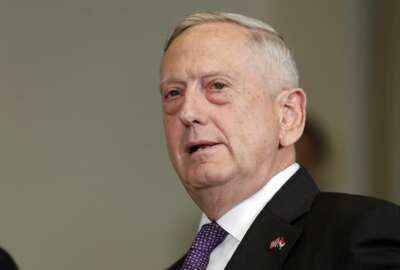
White House asks for delay in recruiting transgender people to military
The Defense Department claims allowing transgender people to join the military by the beginning of the year will be an burden on the Pentagon.
The White House made an 11th hour plea to the D.C. District Court Wednesday night to keep transgender people from joining the military starting Jan. 1. The court is expected to hand down its final decision regarding President Donald Trump’s ban on transgender people in the military on Dec. 11.
The Trump administration claims allowing transgender people to join the military ranks by the beginning of the new year would impose “extraordinary burdens on the department and the military services,” stated a document requesting a stay on the order from the court.
“For organizations as large and as complex as the Defense Department and the military services, the study, development and implementation of significant personnel policies is necessarily a substantial undertaking,” the document stays.
The administration goes on the make the case that recruitment of transgender people requires more than 20,000 recruiters to have knowledge of the standards and identity validation requirements associated with the accession of transgender people.
The White House also argues nearly 3,000 employees across 65 geographically dispersed military processing centers would have to have in-depth knowledge of the standards regarding the recruitment of transgender people into the military.
The district court already filed an injunction blocking Trump’s military transgender ban. The injunction enforces the Obama era policy of keeping transgender people in the military, providing medical care for them and allowing transgender people to join the military starting in 2018.
The plaintiffs in the case are calling bunk on the administration’s request to delay the ascension of transgender people.
Before Trump announced the transgender ban, the defense secretary issued a directive allowing transgender people to join the military by July 1, 2017. The timeline was supported by the Joint Chiefs of Staff.
“The Department of Defense prepared extensively for accession to ensure a smooth transition, issuing a comprehensive implementation handbook in September 2016 and training military personnel ‘to ensure the seamless transition and full implementation of DoD policy,’” the plaintiff response stated.
DoD has extensively studied the effects of transgender people in the military.
Both the RAND Corporation and the New England Journal of Medicine conducted previous studies on the effects of transgender people in the military and found any disruption to be minimal.
DoD announced it was doing another internal study after Trump announced the ban on July 26.
“It’s never bad to have more information, but that having been said, the topic has already been studied to death and every study has come up with the same conclusion, which is that inclusive policy for LGBT troops promotes readiness. If Secretary [James] Mattis undertakes a fair and comprehensive process, he will reach the same conclusion as every other researcher,” said Aaron Belkin, executive director of the Palm Center, a research group that focuses on LGBTQ issues.
The transgender military ban has been criticized by prominent figures in the military and DoD.
Chairman of the Joint Chiefs of Staff Gen. Joseph Dunford, Coast Guard Commandant Adm. Paul Zukunft, Navy Secretary Richard Spencer and other officials have all expressed support for keeping transgender people in the military.
“I believe any individual who meets the physical and mental standards, and is worldwide-deployable and is currently serving, should be afforded the opportunity to continue to serve,” Dunford told Congress on Sept. 26.
Zukunft said he reached out to the 13 transgender members of the Coast Guard after Trump’s tweets and assured them he would not turn his back on them.
“We have made an investment in you and you have made an investment in the Coast Guard, and I will not break faith,” Zukunft said in August.
Spencer told reporters in August that he believed any patriot should be able to serve in the military.
Trump claimed his decision to ban transgender people from the military was based on “consultation with my Generals and military experts,” yet there has been little evidence to support the claim.
In October, Rep. A. Donald McEachin (D-Va.), along with more than 110 other lawmakers, requested the information Trump used to inform his ban.
The lawmakers requested information about “what discussions or correspondence between the Pentagon, if any, led President Trump to make his assertion.” The letter to the administration asks for any letters, emails, telephone transcripts, meeting logs or other material.
“We seek access to these materials in order to determine whether the president, his national security team and military leaders are actively coordinating policy with one another, or whether the president’s transgender ban announcement reflected a breakdown in communication,” the letter stated.
Copyright © 2024 Federal News Network. All rights reserved. This website is not intended for users located within the European Economic Area.
Scott Maucione is a defense reporter for Federal News Network and reports on human capital, workforce and the Defense Department at-large.
Follow @smaucioneWFED





